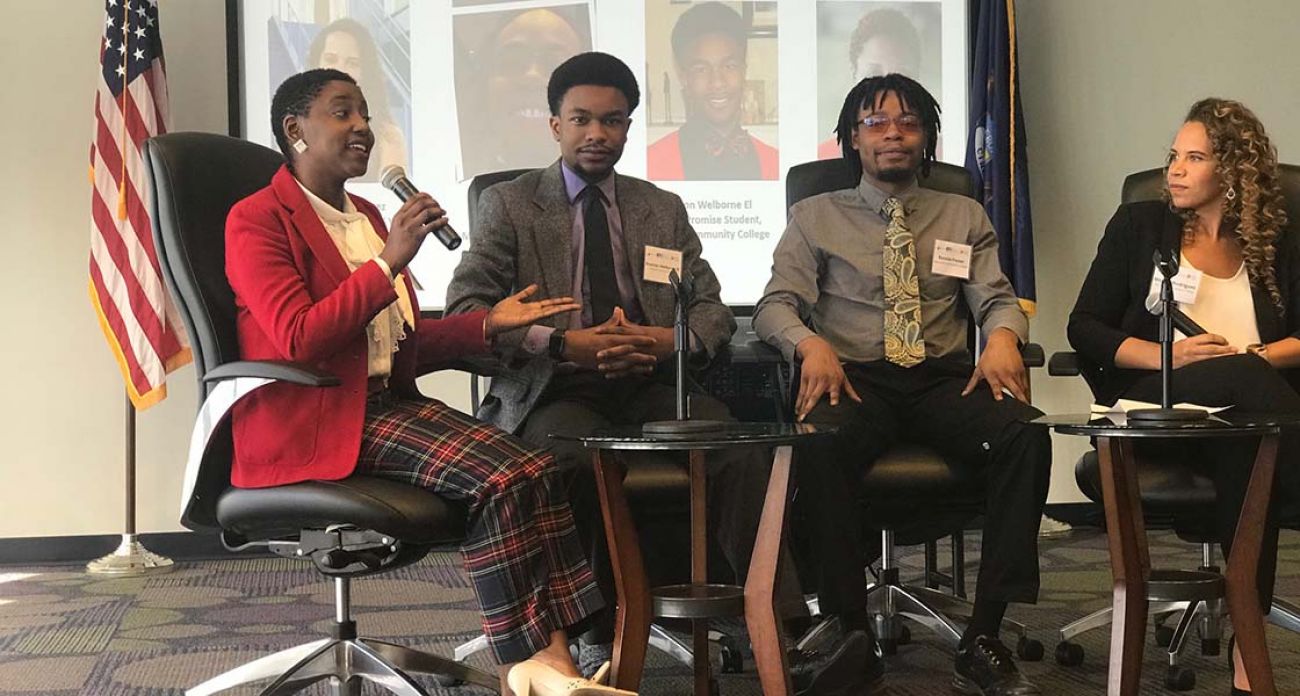Gretchen Whitmer wants free college in Michigan. Can that cut skills gap?

Gov. Gretchen Whitmer’s roads plan is getting no love from Republicans, but another campaign promise – providing two years’ of free tuition – is quietly gaining some bipartisan support.
Results from a Detroit study released Wednesday, though, beg the question of whether simply providing free tuition is enough to help students succeed in college.
Four bills introduced last week would create the Democratic governor’s proposals, the Michigan Opportunity Scholarship and Michigan Reconnect, scholarship programs to help boost the percentage of Michigan residents with post-secondary degrees from 45 percent now to 60 percent by 2030.
Unlike the roads plan, the college tuition bills have some Republican sponsors including Sen. Ken Horn of Frankenmuth. He is sponsoring Senate Bill 268 to establish Michigan Reconnect to pay for tuition for students older than 25 to get associate degrees or certificates for in-demand fields.
The program would require about $40 million to launch. Money could come from existing funds from the Talent and Economic Development Department or supplemental grants.
“We know the more we spend on anything is less money we can spend on roads,” Horn told Bridge.
“This discussion is wide open, it’s bipartisan, bicameral. We’re going to take a measured approach and see where it goes.”
Related:
- For poor and first-generation students, “I think I can is half the battle”
- Seven things to know about Gov. Grethchen Whitmer’s debt-free college plan
- In Tennessee, a model for Michigan’s plan for debt-free community college
- Whitmer pushes college aid. But success rates vary wildly at Michigan schools
- Free tuition brings more low-income students to the University of Michigan
Disagreement over Whitmer’s plan to raise gas taxes 45 cents per gallon to raise $2.5 billion for roads complicates budget discussions over college tuition plans, but discussions so far are amiable, Horn said.
Both plans recently won key support from business groups including the Michigan Chamber of Commerce and Business Leaders of Michigan.
But Horn said Whitmer’s Opportunity Scholarship proposal to pay for two years of college tuition for students graduating high school will be a harder sell to the Legislature.
That program could cost $109 million the first year and more the second year as more students are added, said Brandy Johnson, the governor’s adviser on postsecondary education and workforce development.
The scholarship would provide high school seniors in the class of 2020 and beyond three years of 60 credit hours of tuition at a community college or a two-year, $2,500 scholarship for those attending a four-year college.
The program would have no means testing for community college scholarships but only be eligible for those with household incomes under $80,000 and students with a 3.0 grade point average for four-year schools.
Senate Majority leader Sen. Mike Shirkey, R-Clarklake, and House Speaker Rep. Lee Chatfield, R-Levering, did not respond to requests for comment Wednesday.
Is money is enough?
The programs from Whitmer are modeled after ones in Tennessee, while 11 cities statewide including Detroit offer free tuition programs for their high school graduates, programs commonly known as Promise programs.
Launched in 2013 and administered by the Detroit Regional Chamber, the Detroit Promise doles out scholarships to graduates who attend six participating community colleges or 17 four-year universities. An authority created by Mayor Mike Duggan in 2016 dedicates a portion of tax dollars to permanently fund the two-year scholarships.
Research unveiled Wednesday in Detroit to education leaders suggest that free tuition alone, without extra support, may not be enough to close the skills gap.
MDRC, a nonprofit research group based in New York, partnered with the Detroit Promise to offer additional services to recipients and then studied the impact it had on about 1,200 students over two years.
The extra services included college coaching; $50 per month for expenses such as bus passes and books; summer job opportunities and a management system that tracked student participation.
Researchers found that not all students who applied for and received free tuition enrolled in college. More important, the enrollment and retention rate was higher among students who took advantage of supplemental college coaching in addition to the free tuition.
Of 1,268 students awarded the Detroit Promise scholarship in 2016 and 2017, 829 of them enrolled in college, while 439 didn’t, according to findings released Wednesday.
The students who got college coaching also earned on average two more credits per semester and twice as many summer credits as the other students who received the Detroit Promise funds, according to the MDRC study.
The impact was greater for students taking classes full time. Six percent more students who got college coaching were enrolled full-time during their first semester, 10 percent more were enrolled during second semester compared to students who did not get college coaching, the study shows.
The governor’s free tuition plan would increase access to college, but the Detroit study shows that does not guarantee success, researchers and educators said Wednesday.
“We rarely see results that are this strong. One of the key conclusions is that frequent advising and coaching are vital,” said Alexander Mayer, deputy director of post-secondary education for MDRC.
“We’re getting information in Detroit that all the Promise programs across the country can use.
Whitmer and state legislators need to learn from Detroit, said Yolanda Watson Spiva, president of Complete College America, a nonprofit based in Indianapolis focused on college attainment.
“Every access program starts with money and they all double back because if it doesn’t include a college coaching component you’re not going to get the outcomes you want,” she said. “We’ve proven that.”
Lt. Gov. Garlin Gilchrist said the bipartisan sponsorship on the Reconnect bill shows that Michigan is willing to “put our money where our mouth is” to increase education levels in Michigan.
“We need young people to want to be here and want to stay here. We need to meet them with resources to get them to stay here,” he said. “This program is at the forefront.”
Coaching helps
Money is only half the battle for the 690,000 metro Detroit residents who have some college but no degree, experts said at the conference Wednesday.
Ashley Robinson, a Detroit Promise college coach at Oakland Community College, told Bridge two years ago that students often fail in community college because most have no one at home or in their lives who can help them navigate the college campus, expectations or culture.
Speaking to Bridge again Wednesday, Robinsons said she has seen students gain confidence, learn to advocate for themselves and better budget their time and money.
“The college coaching empowers them to be their own advocate,” she said.
Ronnie Foster, a Detroit Promise student at Macomb Community College, said college success is about more than money.
He wouldn’t have made it past his first semester without the help of a college coach who understood his needs and challenges, he said.
“You need to understand the culture behind the students not just where they come from but their beliefs, culture,” he said, “Then you can tap into the youth. The culture is most important.”
See what new members are saying about why they donated to Bridge Michigan:
- “In order for this information to be accurate and unbiased it must be underwritten by its readers, not by special interests.” - Larry S.
- “Not many other media sources report on the topics Bridge does.” - Susan B.
- “Your journalism is outstanding and rare these days.” - Mark S.
If you want to ensure the future of nonpartisan, nonprofit Michigan journalism, please become a member today. You, too, will be asked why you donated and maybe we'll feature your quote next time!




